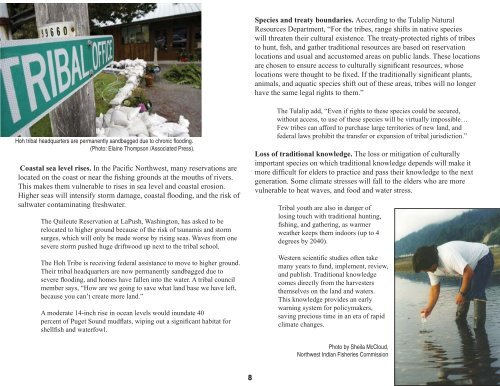Northwest Tribes: Meeting the Challenge of Climate ... - OSU Press
Northwest Tribes: Meeting the Challenge of Climate ... - OSU Press
Northwest Tribes: Meeting the Challenge of Climate ... - OSU Press
You also want an ePaper? Increase the reach of your titles
YUMPU automatically turns print PDFs into web optimized ePapers that Google loves.
Hoh tribal headquarters are permanently sandbagged due to chronic fl ooding.<br />
(Photo: Elaine Thompson /Associated <strong>Press</strong>).<br />
Coastal sea level rises. In <strong>the</strong> Pacifi c <strong>Northwest</strong>, many reservations are<br />
located on <strong>the</strong> coast or near <strong>the</strong> fi shing grounds at <strong>the</strong> mouths <strong>of</strong> rivers.<br />
This makes <strong>the</strong>m vulnerable to rises in sea level and coastal erosion.<br />
Higher seas will intensify storm damage, coastal fl ooding, and <strong>the</strong> risk <strong>of</strong><br />
saltwater contaminating freshwater.<br />
The Quileute Reservation at LaPush, Washington, has asked to be<br />
relocated to higher ground because <strong>of</strong> <strong>the</strong> risk <strong>of</strong> tsunamis and storm<br />
surges, which will only be made worse by rising seas. Waves from one<br />
severe storm pushed huge driftwood up next to <strong>the</strong> tribal school.<br />
The Hoh Tribe is receiving federal assistance to move to higher ground.<br />
Their tribal headquarters are now permanently sandbagged due to<br />
severe fl ooding, and homes have fallen into <strong>the</strong> water. A tribal council<br />
member says, “How are we going to save what land base we have left,<br />
because you can’t create more land.”<br />
A moderate 14-inch rise in ocean levels would inundate 40<br />
percent <strong>of</strong> Puget Sound mudfl ats, wiping out a signifi cant habitat for<br />
shellfi sh and waterfowl.<br />
8<br />
Species and treaty boundaries. According to <strong>the</strong> Tulalip Natural<br />
Resources Department, “For <strong>the</strong> tribes, range shifts in native species<br />
will threaten <strong>the</strong>ir cultural existence. The treaty-protected rights <strong>of</strong> tribes<br />
to hunt, fi sh, and ga<strong>the</strong>r traditional resources are based on reservation<br />
locations and usual and accustomed areas on public lands. These locations<br />
are chosen to ensure access to culturally signifi cant resources, whose<br />
locations were thought to be fi xed. If <strong>the</strong> traditionally signifi cant plants,<br />
animals, and aquatic species shift out <strong>of</strong> <strong>the</strong>se areas, tribes will no longer<br />
have <strong>the</strong> same legal rights to <strong>the</strong>m.”<br />
The Tulalip add, “Even if rights to <strong>the</strong>se species could be secured,<br />
without access, to use <strong>of</strong> <strong>the</strong>se species will be virtually impossible…<br />
Few tribes can afford to purchase large territories <strong>of</strong> new land, and<br />
federal laws prohibit <strong>the</strong> transfer or expansion <strong>of</strong> tribal jurisdiction.”<br />
Loss <strong>of</strong> traditional knowledge. The loss or mitigation <strong>of</strong> culturally<br />
important species on which traditional knowledge depends will make it<br />
more diffi cult for elders to practice and pass <strong>the</strong>ir knowledge to <strong>the</strong> next<br />
generation. Some climate stresses will fall to <strong>the</strong> elders who are more<br />
vulnerable to heat waves, and food and water stress.<br />
Tribal youth are also in danger <strong>of</strong><br />
losing touch with traditional hunting,<br />
fi shing, and ga<strong>the</strong>ring, as warmer<br />
wea<strong>the</strong>r keeps <strong>the</strong>m indoors (up to 4<br />
degrees by 2040).<br />
Western scientifi c studies <strong>of</strong>ten take<br />
many years to fund, implement, review,<br />
and publish. Traditional knowledge<br />
comes directly from <strong>the</strong> harvesters<br />
<strong>the</strong>mselves on <strong>the</strong> land and waters.<br />
This knowledge provides an early<br />
warning system for policymakers,<br />
saving precious time in an era <strong>of</strong> rapid<br />
climate changes.<br />
Photo by Sheila McCloud,<br />
<strong>Northwest</strong> Indian Fisheries Commission



